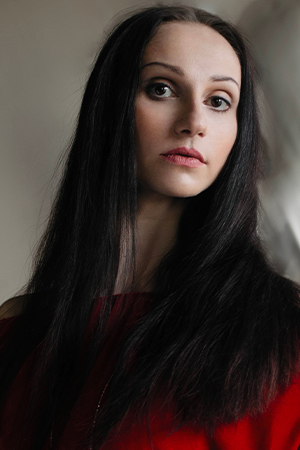
She has a naturally pliant torso, supple arms and exceptionally pointed feet, and she used her elegant carriage with fresh spirit. She danced with unmannered lyricism and illuminated Tchaikovsky's score with ravishing, languid phrasing. She played the evil temptress Odile without jarring sauciness. She painted a rhythmic portrait through staccato gestures.
Los Angeles Times
The young dancer’s technique is pleasing for its pure lines, the clarity of the phrasing, the beautifully nuanced arabesques of her variations, her dynamism-filled tours around the stage and her flawless fouettés.
Ballet magazine
The artiste captivates with the precision of her poses, the softness and that somehow special cantilena in the lines of her neck, shoulders and arms. In the duets with Conrad, Skorik achieves a deep synthesis of music and choreography, turning the dance into visible music.
Ballet magazine
• Recipient of the Léonide Massine Prize in the category “Emerging Talent on the International Scene” (Positano, Italy, 2014)
• Recipient of the Spirit of Dance prize in the category “Rising Star” (2012)
• Prize-winner at the XII International Ballet Dancers’ and Choreographers’ Competition in Moscow (2nd prize, 2013)
• Scholarship holder of the Children of Russia programme (2005–2006)
• Prize-winner at the III International Youth Classical Dance Competition Fouetté of Artek (1st Prize, 2000)
Born in Kharkov (Ukraine).
Graduated from the Perm School of Dance in 2007.
Joined the Mariinsky Ballet the same year.
Principal since 2015.
Repertoire includes:
La Sylphide (Sylph); choreography by August Bournonville, revised version by Elsa-Marianne von Rosen,
Giselle (Giselle, Monna, Zulma); choreography by Jean Coralli, Jules Perrot and Marius Petipa,
La Fille du Pharaon (Aspiccia); choreography by Marius Petipa reconstructed by Toni Candeloro,
La Bayadère (Nikia, Gamzatti, Trio of Shades); choreography by Marius Petipa, revised version by Vladimir Ponomarev and Vakhtang Chabukiani,
The Sleeping Beauty (La Fée des Lilas); choreography by Marius Petipa, revival of the 1890 production, staging by Sergei Vikharev,
The Sleeping Beauty (Aurora, Lilac Fairy, Princess Florine); choreography by Marius Petipa, revised version by Konstantin Sergeyev,
Swan Lake (Odette-Odile, Swans, Two Swans); choreography by Marius Petipa and Lev Ivanov, revised version by Konstantin Sergeyev,
Raymonda (Raymonda); choreography by Marius Petipa, revised version by Konstantin Sergeyev,
“Paquita” Grand pas (variation); choreography by Marius Petipa,
Pas de six from the ballet Esmeralda; choreography by Marius Petipa,
The Nutcracker (Masha); choreography Vasily Vainonen,
Le Corsaire (Medora); production by Pyotr Gusev after the composition and choreography by Marius Petipa,
Don Quixote (Kitri, Queen of the Dryads); choreography by Alexander Gorsky,
Grand pas classique; choreography by Viktor Gsovsky,
Michel Fokine's ballets Chopiniana (Nocturne, Mazurka, Seventh Waltz, First Waltz) and Schéhérazade (Zobeide), The Swan,
George Balanchine's ballets Serenade, Symphony in C (II. Adagio, III. Allegro vivace), Jewels (Diamonds, Rubies), A Midsummer Night’s Dream (Titania, Act II – Soloist in the Divertissement), Piano Concerto No 2 (Ballet Imperial), Tchaikovsky Pas de deux,
The Fountain of Bakhchisarai (Zarema); choreography by Rostislav Zakharov,
Romeo and Juliet (Juliet), Walpurgis Night (Bacchante); choreography by Leonid Lavrovsky,
Spartacus (Aegina); choreography by Leonid Yakobson,
The Legend of Love (Mekhmeneh-Bahnu), The Stone Flower (The Mistress of the Copper Mountain); choreography by Yuri Grigorovich,
Carmen-Suite (Carmen); choreography by Alberto Alonso,
Ondine (Four Naiads); choreography by Pierre Lacotte,
In the Night; choreography by Jerome Robbins,
Frederick Ashton's ballets Marguerite and Armand (Marguerite), Sylvia (Sylvia),
Variations for two couples; choreography by Hans van Manen,
The Nutcracker (Masha); production by Mihail Chemiakin, choreography by Kirill Simonov,
Anna Karenina (Anna Karenina),
Le Parc (soloist); choreography by Angelin Preljocaj,
Infra; choreography by Wayne McGregor,
The Bronze Horseman (the Queen of the Ball); choreography by Rostislav Zakharov, Yuri Smekalov,
and Paquita (Paquita); choreography by Yuri Smekalov, reconstruction and staging of Marius Petipa's choreography (Act III Grand Pas) by Yuri Burlaka,
The Fairy's Kiss (the Fairy I); choreography by Maxim Petrov,
Danses Сoncertantes; choreography by Alexander Sergeev.
Repertoire also includes:
Bacchanalia; choreography by Alexander Gorsky,
Raymonda (Raymonda); choreography by Marius Petipa, revised version by Konstantin Sergeyev and Eldar Aliev.
In 2012 and 2025 she performed at the Rudolf Nureyev International Ballet Festival at the Bashkir State Opera and Ballet Theatre. In March 2025, as part of the festival, she danced the leading role in Swan Lake.
In 2022 she took part in the 20th Galina Ulanova Festival at the Mari El State Opera and Ballet Theatre named after E. Sapaev (Yoshkar-Ola).
Between 2021 and 2024 she performed at the Ballet Summer International Festival at the National Academic Bolshoi Opera and Ballet Theatre of Belarus. Her appearances included lead roles in The Sleeping Beauty and Swan Lake (productions by Valentin Elizariev), as well as Illusions of Love (choreography by Igor Kolb).